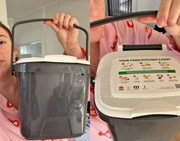Owning a home used to be a milestone…now it’s a miracle—here’s why
By
Maan
- Replies 0
A wild warning about Sydney’s future has reignited calls to overhaul Australia’s tax system.
A top union boss claimed the next generation may not be able to live where they were born—let alone raise families.
And the culprit, she said, is negative gearing.
ACTU secretary Sally McManus urged the Albanese Government to limit negative gearing tax breaks to just one investment property per person.
She made the explosive call during an appearance, warning that without bold action, Australia would effectively abandon younger generations.
‘Otherwise, we’re just saying—too bad young people, you’re not going to be able to ever own a home, forget about even thinking about it,’ Ms McManus said.
‘Since 2019, the problem has just got worse… unless the government is brave enough to do something about it, we are just abandoning those generations and we think that that is fundamentally wrong.’
Unions plan to present this proposal at the Albanese Government’s productivity roundtable in Canberra in August.
Negative gearing allows property investors to deduct rental losses from their taxable income.
While entirely legal and also applicable to other types of investments, critics argue it gives landlords an unfair tax advantage, pricing out first-home buyers.
‘Young people should have the same aspirations as the generations before them… and at the moment, they don’t,’ Ms McManus said.
She pointed to rising house prices, which have doubled the rate of wage growth over the past 25 years.
‘Now, supply is part of that issue and we’ve got proposals around that,’ she added.
‘But we also think that the tax system has to change too… because that has fuelled those housing prices and taken it out of reach for young people.’
Under the union’s plan, existing arrangements would be grandfathered for five years before limiting the tax break to one investment property.
‘You can have as many investment properties as you want, but in terms of the tax benefit, limit that to one,’ Ms McManus said.
She said just one per cent of investors owned 25 per cent of all investment properties—pushing up prices and locking out everyday workers.
‘Unless we change it, working people can’t live where they work… they can’t live where they grew up,’ she said.
‘A study in New South Wales said that there will be no grandchildren in Sydney because people between the ages of 30 and 40 can’t afford to live there.’
She also encouraged the government to support modular housing as a faster, cheaper option and called for changes to allow superannuation funds to invest more freely in housing.
Treasurer Jim Chalmers appeared open to the broader debate, telling the National Press Club: ‘I expect, I anticipate, I welcome tax being an important part of the conversation.’
However, Prime Minister Anthony Albanese continued to express concerns about negative gearing reform.
He warned that removing tax incentives could reduce housing supply, which could worsen the rental crisis.
‘Well, when it has been looked at, it’s been shown that it won’t assist supply, and that’s the problem here,’ Mr Albanese said in a previous statement.
‘If you didn’t have investment in housing, you wouldn’t have private rentals… less supply and less construction is the concern which is there.’
‘Look, my view is that the key to housing policy is supply,’ he added.
Economists have suggested that changes to negative gearing—along with capital gains tax reforms—could reduce home prices by 2 to 4 per cent in the medium term.
However, they also warned that discouraging investors might hurt the development of new housing, potentially making affordability worse in the long run.
If you’re wondering whether limiting negative gearing would actually solve the housing crisis, not everyone is convinced.
Some experts believe the problem runs deeper than tax policy—and that reforms might not deliver the results people are hoping for.
Here’s a thoughtful take from a well-known finance writer who breaks down the bigger picture.
Read more: Why scrapping negative gearing won’t fix the housing crisis—by Noel Whittaker

Can Australia fix housing affordability without driving away the very investors who help build it?
A top union boss claimed the next generation may not be able to live where they were born—let alone raise families.
And the culprit, she said, is negative gearing.
ACTU secretary Sally McManus urged the Albanese Government to limit negative gearing tax breaks to just one investment property per person.
She made the explosive call during an appearance, warning that without bold action, Australia would effectively abandon younger generations.
‘Otherwise, we’re just saying—too bad young people, you’re not going to be able to ever own a home, forget about even thinking about it,’ Ms McManus said.
‘Since 2019, the problem has just got worse… unless the government is brave enough to do something about it, we are just abandoning those generations and we think that that is fundamentally wrong.’
Unions plan to present this proposal at the Albanese Government’s productivity roundtable in Canberra in August.
Negative gearing allows property investors to deduct rental losses from their taxable income.
While entirely legal and also applicable to other types of investments, critics argue it gives landlords an unfair tax advantage, pricing out first-home buyers.
‘Young people should have the same aspirations as the generations before them… and at the moment, they don’t,’ Ms McManus said.
She pointed to rising house prices, which have doubled the rate of wage growth over the past 25 years.
‘Now, supply is part of that issue and we’ve got proposals around that,’ she added.
‘But we also think that the tax system has to change too… because that has fuelled those housing prices and taken it out of reach for young people.’
Under the union’s plan, existing arrangements would be grandfathered for five years before limiting the tax break to one investment property.
‘You can have as many investment properties as you want, but in terms of the tax benefit, limit that to one,’ Ms McManus said.
She said just one per cent of investors owned 25 per cent of all investment properties—pushing up prices and locking out everyday workers.
‘Unless we change it, working people can’t live where they work… they can’t live where they grew up,’ she said.
‘A study in New South Wales said that there will be no grandchildren in Sydney because people between the ages of 30 and 40 can’t afford to live there.’
She also encouraged the government to support modular housing as a faster, cheaper option and called for changes to allow superannuation funds to invest more freely in housing.
Treasurer Jim Chalmers appeared open to the broader debate, telling the National Press Club: ‘I expect, I anticipate, I welcome tax being an important part of the conversation.’
However, Prime Minister Anthony Albanese continued to express concerns about negative gearing reform.
He warned that removing tax incentives could reduce housing supply, which could worsen the rental crisis.
‘Well, when it has been looked at, it’s been shown that it won’t assist supply, and that’s the problem here,’ Mr Albanese said in a previous statement.
‘If you didn’t have investment in housing, you wouldn’t have private rentals… less supply and less construction is the concern which is there.’
‘Look, my view is that the key to housing policy is supply,’ he added.
Economists have suggested that changes to negative gearing—along with capital gains tax reforms—could reduce home prices by 2 to 4 per cent in the medium term.
However, they also warned that discouraging investors might hurt the development of new housing, potentially making affordability worse in the long run.
If you’re wondering whether limiting negative gearing would actually solve the housing crisis, not everyone is convinced.
Some experts believe the problem runs deeper than tax policy—and that reforms might not deliver the results people are hoping for.
Here’s a thoughtful take from a well-known finance writer who breaks down the bigger picture.
Read more: Why scrapping negative gearing won’t fix the housing crisis—by Noel Whittaker
Key Takeaways
- ACTU called for negative gearing tax breaks to be limited to one property by 2030.
- The proposal would be grandfathered for five years to allow adjustment.
- Unions warned young Australians are being priced out of owning homes.
- Economists remain divided on whether reform would help or harm housing supply.
Can Australia fix housing affordability without driving away the very investors who help build it?








